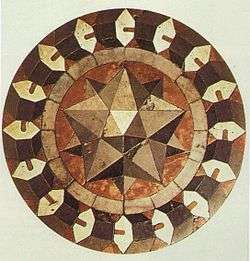Rhombitriheptagonal tiling
| Rhombitriheptagonal tiling | |
|---|---|
 Poincaré disk model of the hyperbolic plane | |
| Type | Hyperbolic uniform tiling |
| Vertex configuration | 3.4.7.4 |
| Schläfli symbol | rr{7,3} or |
| Wythoff symbol | 3 | 7 2 |
| Coxeter diagram | |
| Symmetry group | [7,3], (*732) |
| Dual | Deltoidal triheptagonal tiling |
| Properties | Vertex-transitive |
In geometry, the rhombitriheptagonal tiling is a semiregular tiling of the hyperbolic plane. At each vertex of the tiling there is one triangle and one heptagon, alternating between two squares. The tiling has Schläfli symbol rr{7, 3}. It can be seen as constructed as a rectified triheptagonal tiling, r{7,3}, as well as an expanded heptagonal tiling or expanded order-7 triangular tiling.
Dual tiling
The dual tiling is called a deltoidal triheptagonal tiling, and consists of congruent kites. It is formed by overlaying an order-3 heptagonal tiling and an order-7 triangular tiling.
Related polyhedra and tilings
From a Wythoff construction there are eight hyperbolic uniform tilings that can be based from the regular heptagonal tiling.
Drawing the tiles colored as red on the original faces, yellow at the original vertices, and blue along the original edges, there are 8 forms.
| Uniform heptagonal/triangular tilings | |||||||||||
|---|---|---|---|---|---|---|---|---|---|---|---|
| Symmetry: [7,3], (*732) | [7,3]+, (732) | ||||||||||
 |
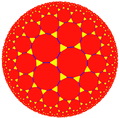 |
 |
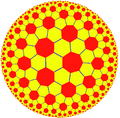 |
 |
 |
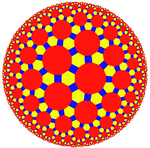 |
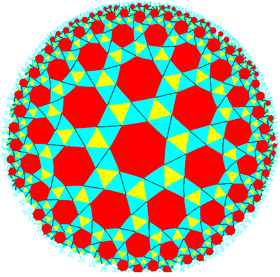 | ||||
| {7,3} | t{7,3} | r{7,3} | t{3,7} | {3,7} | rr{7,3} | tr{7,3} | sr{7,3} | ||||
| Uniform duals | |||||||||||
 |
 |
 |
 |
 |
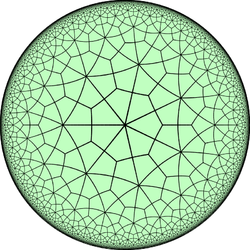 |
 |
 | ||||
| V73 | V3.14.14 | V3.7.3.7 | V6.6.7 | V37 | V3.4.7.4 | V4.6.14 | V3.3.3.3.7 | ||||
Symmetry mutations
This tiling is topologically related as a part of sequence of cantellated polyhedra with vertex figure (3.4.n.4), and continues as tilings of the hyperbolic plane. These vertex-transitive figures have (*n32) reflectional symmetry.
| *n42 symmetry mutation of expanded tilings: 3.4.n.4 | ||||||||||||
|---|---|---|---|---|---|---|---|---|---|---|---|---|
| Symmetry *n32 [n,3] |
Spherical | Euclid. | Compact hyperb. | Paraco. | Noncompact hyperbolic | |||||||
| *232 [2,3] |
*332 [3,3] |
*432 [4,3] |
*532 [5,3] |
*632 [6,3] |
*732 [7,3] |
*832 [8,3]... |
*∞32 [∞,3] |
[12i,3] |
[9i,3] |
[6i,3] | ||
| Figure |  |
 |
 |
 |
 |
 |
 |
 |
 |
 | ||
| Config. | 3.4.2.4 | 3.4.3.4 | 3.4.4.4 | 3.4.5.4 | 3.4.6.4 | 3.4.7.4 | 3.4.8.4 | 3.4.∞.4 | 3.4.12i.4 | 3.4.9i.4 | 3.4.6i.4 | |
See also
| Wikimedia Commons has media related to Uniform tiling 3-4-7-4. |
- Rhombitrihexagonal tiling
- Order-3 heptagonal tiling
- Tilings of regular polygons
- List of uniform tilings
- Kagome lattice
References
- John H. Conway, Heidi Burgiel, Chaim Goodman-Strass, The Symmetries of Things 2008, ISBN 978-1-56881-220-5 (Chapter 19, The Hyperbolic Archimedean Tessellations)
- "Chapter 10: Regular honeycombs in hyperbolic space". The Beauty of Geometry: Twelve Essays. Dover Publications. 1999. ISBN 0-486-40919-8. LCCN 99035678.
External links
- Hyperbolic and Spherical Tiling Gallery
- KaleidoTile 3: Educational software to create spherical, planar and hyperbolic tilings
- Hyperbolic Planar Tessellations, Don Hatch
